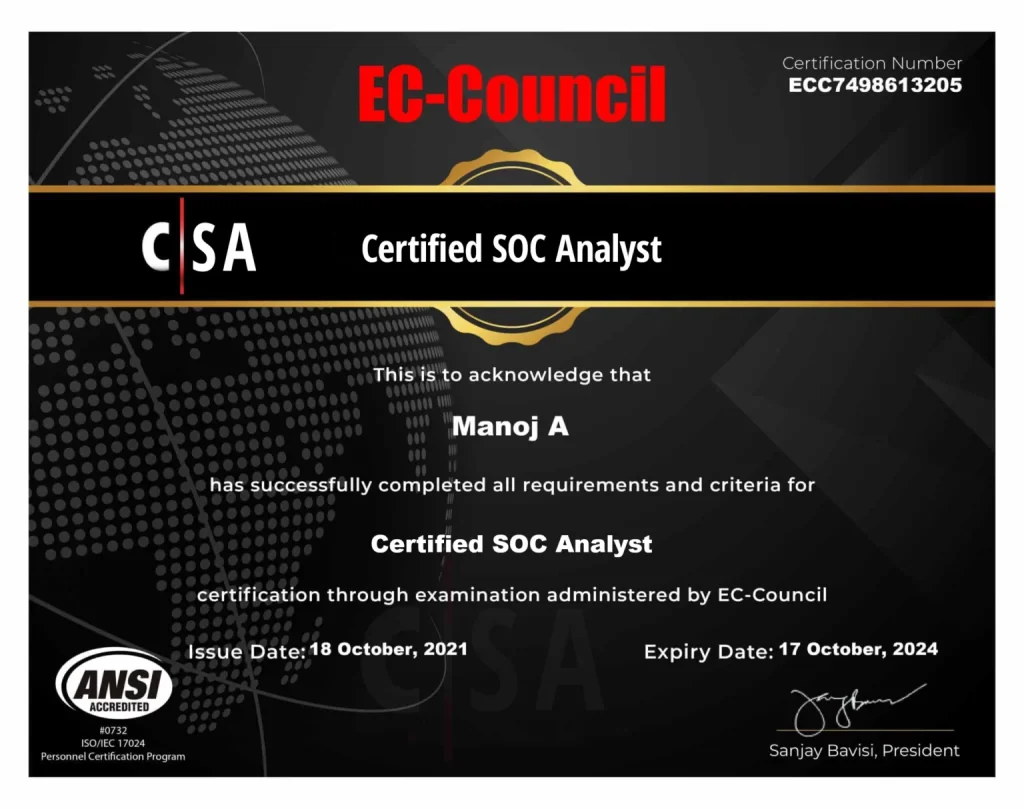SOC Analyst Training Course in Delhi - CSA V10 Certification Training
- Powered by

- Assured Job with 4LPA to 9LPA*
- Course Aligned to CSA Curriculum
- 90% Practical Topics
SOC analyst training course in Delhi equips you with the knowledge and skills to defend against cyberattacks and secure digital infrastructures. Whether you are a professional looking to upskill or a newcomer to the field, this SOC training certification in Delhi is designed to meet your needs. Come meet our soc analyst Training course in Delhi

Book a free Demo class now!
Check out the program and fee details in our brochure
- Program Overview
- Curriculum
- Tools
- Certificate and Examination
- Faculty
- Fees
- Placement Cell
- FAQ's
SOC Analyst Training in Delhi – Key Highlights
- Understanding the Fundamentals
- Hands-On Learning: Practical Application of Techniques
- Real-World Case Studies: Learning from Industry Experts
- Advanced Techniques
- Certification and Accreditation: Paving the Path to Success
- Career Guidance and Placement Assistance: Launching Careers in Cybersecurity
SOC Analyst Training Course in Delhi Overview
Our SOC course in Delhi offers a comprehensive education in safeguarding digital systems and data against cyber threats. This program is designed to equip students with the knowledge and skills needed to protect organizations and individuals from cyberattacks, data breaches, and other online dangers. Students will gain a deep understanding of cybersecurity principles, including risk management, network security, security operations, and digital forensics. The SOC course provides hands-on experience with the latest tools and techniques used in the industry, ensuring that graduates are well-prepared for a career in cybersecurity.
What is a SOC (Security Operations Center) Course?
A SOC (Security Operations Center) course involves learning the practices and techniques used to monitor and defend computer systems, networks, and applications from digital threats. These threats often aim to compromise data integrity, privacy, and system functionality.
Key Components of a SOC Course
Network Monitoring and Defense: Involves techniques for monitoring network traffic, detecting anomalies, and responding to potential threats in real-time.
Incident Response: Focuses on the processes and procedures used to handle and mitigate security incidents effectively, minimizing impact and restoring normal operations swiftly.
Security Information and Event Management (SIEM): Teaches how to use SIEM tools to collect, analyze, and correlate security events across an organization’s IT infrastructure.
Threat Intelligence: Covers methods for gathering, analyzing, and applying threat intelligence to preemptively defend against emerging cyber threats.
Importance of a SOC Course
A SOC course is essential for organizations and individuals due to several reasons. It helps maintain the integrity and availability of critical data and systems. By understanding SOC principles, professionals can proactively defend against cyber-attacks, safeguarding sensitive information and maintaining operational continuity.
What is Ethical Hacking in the Context of a SOC Course?
Ethical hacking within a SOC course involves authorized attempts to compromise computer systems and networks to assess their security. Ethical hackers, also known as white-hat hackers, employ similar methods as malicious actors but do so with permission to identify vulnerabilities and strengthen defenses.
Roles and Responsibilities in a SOC Course
Participants in a SOC course learn to monitor and analyze security incidents, respond to alerts, and conduct forensic investigations. They play a crucial role in maintaining the security posture of organizations by identifying and mitigating vulnerabilities before they can be exploited.
How Ethical Hacking Enhances Security in a SOC Course
Ethical hacking practices taught in a SOC course contribute significantly to enhancing security. By identifying weaknesses and recommending security enhancements, ethical hackers help organizations preemptively defend against cyber threats. Their proactive approach is instrumental in maintaining robust security practices and fostering a secure digital environment.
No Coding Knowledge is required to take this course
The Duration for this course is 45 Days- Upto 80 Hours
Anyone with basic computer knowledge can take this course
Get a Complete guide on Ethical Hacking
Download now
Programs Key Points
Targeted Certification: EC Council
Level: Beginner to Intermediate
Durations: 80 hours *45 days [flexible timings]
Practical: 90% – 6+ Modules Covered
Prerequisite’s:
To be eligible, learners must have either a high school diploma or an undergraduate degree
Training Mode:
Offline Classroom Training
Online- Live Training
Selfpaced Training
For Admission
+91 9844046170
admission@digived.academy
SOC Analyst Training Program
Curriculum
In the dynamic field of cybersecurity, the SOC (Security Operations Center) CSA V10 Certification Training stands as a crucial credential for both aspiring and experienced professionals. The CSA V10 course curriculum is meticulously designed to encompass the latest methodologies and tools, equipping candidates with the skills needed to combat contemporary cyber threats effectively.
Introduction to SOC: Exploring the Role and Significance of a Security Operations Center
Gain insight into the pivotal role and significance of a Security Operations Center (SOC) in modern cybersecurity practices.
SOC Architecture: Exploring Various Models and Frameworks
Explore the diverse models and frameworks that underpin Security Operations Centers (SOCs), essential for effective cybersecurity management.
SOC Processes and Procedures: Managing Incidents, Changes, and Configurations
Delve into the structured processes and procedures crucial for SOC operations, including incident management, change management, and configuration management.
SOC Tools and Technologies: Overview of Essential Tools
Get an overview of key tools and technologies utilized in SOC environments, such as SIEM (Security Information and Event Management), IDS/IPS (Intrusion Detection and Prevention Systems), firewalls, and more.
Compliance and Legal Considerations: Understanding Requirements
Understand the critical compliance requirements and legal considerations that shape security operations within a SOC environment.
Cyber Threat Landscape: Understanding Various Types of Cyber Threats
Explore the diverse types of cyber threats and their distinct characteristics within the current cybersecurity landscape.
Indicators of Compromise (IoCs): Identification and Insight
Gain insights into identifying and comprehending Indicators of Compromise (IoCs), essential for detecting potential security breaches.
Attack Methodologies: Common Tactics and Techniques
Examine prevalent attack vectors and methodologies employed by cyber adversaries to compromise systems and networks.
Threat Actors: Understanding Motivations and Types
Gain an understanding of the different categories of threat actors and their motivations behind cyber attacks.
Threat Hunting: Proactive Techniques and Strategies
Learn proactive techniques and strategies for effectively hunting down potential cyber threats before they manifest into security incidents.
Event and Incident Management: Differentiating Events from Incidents
Understand the distinction between events and incidents in the context of cybersecurity management.
Logging Fundamentals: Significance and Types of Logs
Explore the importance of logging in cybersecurity operations and the various types of logs utilized.
Log Management: Best Practices for Collection, Storage, and Analysis
Learn essential best practices for the collection, storage, and analysis of logs to maintain effective cybersecurity posture.
Event Correlation: Techniques for Identifying Incidents
Discover techniques for correlating events to identify potential security incidents promptly and accurately.
Incident Reporting: Procedures for Documentation and Reporting
Gain insights into proper procedures for documenting and reporting cybersecurity incidents to ensure timely response and resolution.
Introduction to SIEM: Understanding SIEM Technology and Its Role
Gain an overview of SIEM (Security Information and Event Management) technology and its significance in modern cybersecurity operations.
SIEM Architecture: Components and Structure of SIEM Solutions
Explore the architecture and essential components of SIEM solutions that enable comprehensive security monitoring and incident response.
Log Collection and Analysis: Techniques for Effective Log Management
Learn techniques for efficiently collecting, storing, and analyzing logs using SIEM to detect and respond to security incidents.
Rule Creation and Management: Developing and Maintaining Correlation Rules
Discover best practices for creating and managing correlation rules within SIEM to enhance threat detection and incident response capabilities.
Alert Management: Handling and Responding to SIEM Alerts
Understand procedures for effectively managing and responding to alerts generated by SIEM systems to mitigate potential security threats.
Threat Intelligence Fundamentals: Importance and Overview
Explore the fundamentals of threat intelligence, emphasizing its crucial role in modern cybersecurity strategies.
Sources of Threat Intelligence: Various Data Sources
Learn about the diverse sources of threat intelligence that provide valuable insights into potential cyber threats.
Integrating Threat Intelligence with SIEM: Enhancing Security Operations
Discover methods for integrating threat intelligence with SIEM (Security Information and Event Management) systems to bolster threat detection and incident response capabilities.
Threat Intelligence Platforms: Tools and Platforms Overview
Gain an overview of the different platforms and tools used for gathering, analyzing, and applying threat intelligence in cybersecurity operations.
Advanced Threat Detection: Techniques and Strategies
Explore advanced techniques for leveraging threat intelligence to detect and mitigate sophisticated cyber threats effectively.
Incident Response Lifecycle: Phases of Effective Incident Management
Explore the structured phases that comprise the incident response lifecycle, ensuring robust cybersecurity incident management.
Preparation: Ready-Made Readiness
Prepare for incident response by developing policies, assembling response teams, and conducting readiness exercises.
Identification: Spotting the Telltale Signs
Identify and confirm security incidents promptly through proactive monitoring and analysis.
Containment: Limiting the Fallout
Contain the impact of incidents swiftly to prevent further compromise or damage.
Eradication and Recovery: Eliminating Threats and Restoring Normalcy
Efficiently remove threats from systems and networks while restoring operations to a secure state.
Post-Incident Activities: Learning from Experience
Reflect on lessons learned, document incidents comprehensively, and refine incident response processes for continuous improvement.
Tools used for SOC training program in Delhi Covered






















Book a free Demo class now!
Check out the program and fee details in our brochure
SOC Analyst Certification and Examination
CSA V10 Certification Training in Delhi with certificate from reputed Institute


American National Standards Institute

ANSI National Accreditation Board

American council on education

Nice education consultancy
Our SOC Training Institute Reviews
At our SOC training institute, we are committed to providing top-tier training to our students and equipping tech-savvy professionals with state-of-the-art tools. Contact us for more details on how we can support your career in security operations.
Sonu Singh
Student
Nidhi
Student
Vikram
Student
Suchitra
Student
Pradeep
Student
Learn Experience
Program Fees Structure
Program Fee
INR 45,000/-
+18 % GST
Payment Option
Our admissions close once the requisite number of participants enroll for the upcoming batch. Apply early to secure your seats.
Program Fee includes
- CSA V10 Exam Voucher
- Job / Internship Assistance Provided
- Tools and Labs Included
Start your Cyber Security Career Now
Download now
SOC Analyst Admission Process
Our admissions close once the requisite number of participants enroll for the upcoming batch. Apply early to secure your seats.
Apply Online
We provide students 100% Job and Internship Support after Completion of the course
Application Screening
Our counselors schedule video calls with learners and assist them in filling out the application accurately.
Join Program
program team conducts additional doubt-clearing sessions with industry experts to provide learners with practical and in-depth knowledge.
SOC Analyst Placement Cell work

Job assistance
Apply the program skills for professional advancement

Resume Feedback
Apply the program skills for professional advancement

Mock Interview
Apply the program skills for professional advancement

Soft Skills
Apply the program skills for professional advancement
SOC Analyst Training course FAQ's
A course designed to teach the fundamentals of Security Operations Centers (SOC) and their operations.
The course covers SOC architecture, processes, tools, compliance, incident management, and threat intelligence.
The course is designed for IT professionals, cybersecurity enthusiasts, and anyone interested in network security.
WIth digvedtech the certification will last for upto 4 years.
Basic knowledge of networking and security concepts is beneficial but not mandatory.
The course duration typically ranges from a few weeks to a couple of months, depending on the level of depth and specialization.
You will receive a globally recognized certification from digivedtech Academy
Yes, the course includes practical sessions with real-world scenarios to enhance your skills.
Yes, digivedtech offers both in-person and online training options.
Graduates can pursue roles like SOC Analyst, Security Consultant, and Cybersecurity Specialist.
Yes, digivedtech provides placement support to help you secure a job in the cybersecurity field.
Yes, there are flexible batch timings to accommodate working professionals.
SOC Analyst Training Course in Delhi
As cyber threats become increasingly sophisticated, organizations worldwide are investing heavily in Security Operations Centers (SOCs) to safeguard their assets and ensure continuous protection against cyber attacks. If you’re looking to enhance your cybersecurity skills and embark on a rewarding career, our SOC Training Course with digivedtech academy in Delhi provides perfect opportunity to learn right from basic to intermediate level.
Why Choose digivedtech academy for SOC Traning in Delhi?
By choosing digivedtech academy SOC training in Delhi, you’ll be positioning yourself at the heart of the industry’s action, surrounded by opportunities for networking, collaboration, and career growth.
What is a SOC?
A Security Operations Center (SOC) is a centralized unit that deals with security issues on an organizational and technical level. The primary function of a SOC is to monitor, detect, investigate, and respond to cyber threats around the clock. This involves a combination of technology, processes, and skilled professionals working together to protect the organization’s digital infrastructure. What to know more on SOC training in Delhi contact us now
SOC training in Delhi Course Overview
- Security Operations and Management
- Understanding Cyber Threats and Attach Methodology
- Incidents, Events and Logging
- Security Information and events
- Enhanced Incident Detection with threat Intelligence
- Incident Response
Why Enroll in Our SOC Training Course in Delhi?
- Expert Instructors: Learn from industry veterans with over 20+ years of experience and credentials from prestigious institutions.
- Hands-On Training: Engage in practical exercises and real-world simulations using top-notch tools and technologies.
- Comprehensive Curriculum: Gain a thorough understanding of SOC operations, tools, and strategies.
- Career Support: Benefit from career guidance, networking opportunities, and assistance with job placements.
What are the benefits of joining SOC classes with digibedtech.academy
- CSA v10 Exam Voucher
- Job/ Internship Assistance Provided
- Tools and Labs Included
What is SOC Training fee in Delhi
SOC Program fee starts from 45,000/- for a duration of 45days or 80 hours
Digivedtech academy SOC Training Course in Delhi can significantly boost your career prospects in the cybersecurity field. With a solid foundation in SOC principles and hands-on experience, you’ll be well-equipped to tackle modern cyber threats and contribute to the safety and security of any organization. Don’t miss out on this opportunity to advance your skills and join the ranks of elite cybersecurity professionals. Contact us for more details on SOC Analyst Training course in Delhi with certification.
